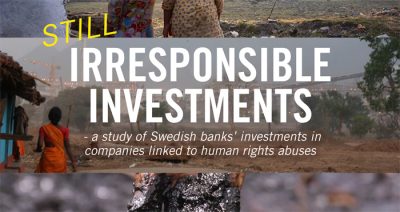
Over the years, BMA has been involved in a number of resolution campaigns targeting the shareholders of Dow Chemical, and this year of DowDuPont, at their annual AGM. We believe that the Bhopal issue by itself is not only enough to make Dow a dreadful performer in terms of corporate ethics and human rights but that these issues constitute a grave risk to the investor.
In 2015 Amnesty International published a study of how Swedish banks act when they invest in companies involved in abuses of human rights. The results showed that despite the banks having policies committing them to only invest in companies that respect human rights, they failed to live up to the required standard.
Now, a new study aims to assess developments compared to 2015, and in relation to HRDD, which is part of a company’s responsibility to respect human rights under the UN Guiding Principles on Business and Human Rights.
It is well established that these international standards on corporate responsibility apply to the entire range of financial institutions and actors, including commercial banks, retail banks, investment banks, rating agencies, financial service providers, and institutional investors; but, the banks seem to be dragging their feet where Dow is concerned and according to the report:
“None of the banks acknowledge that the company has violated international standards and have therefore not engaged with the company on the issue (of Bhopal). All the banks justify the lack of engagement by the fact that no court has attributed legal responsibility to Dow for providing remedy to the people affected by the Bhopal disaster. None of the banks however address the fact that court cases against Dow and its wholly owned subsidiary Union Carbide have not been able to proceed in Indian courts because the companies refuse to show up in court, thereby absconding justice.”
Amnesty’s main recommendation to the banks is that: “Banks investing in DowDuPont should at a minimum exert pressure on the company to comply with court summons in India in order that victims’ rights to remedy can be addressed.”
Our belief is that the more pressure is exerted on the investors of DowDuPont then the more likely the company is to do the right thing in Bhopal and the message seems clear: whether it’s for the sake of the people of Bhopal, or merely for the sake of your own wallet, you will do well to disinvest in DowDuPont.
How Bhopal is harming Dow’s (now DowDuPont’s) financial prospects
Amnesty Report, 2018, Irresponsible Investments.


